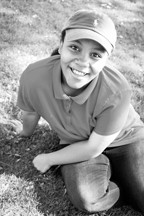Amarah's Corner: Trauma of Children of addicts & alcoholics

Jesus said in Matthew 25:40 (KJV), “Whatever you’ve done unto the least of these (kids and/or adults), you’ve done it unto me.”
Kids like me are kids and adults of all ages whose parents are, or were, drug addicts, and alcoholics; kids who have suffered, or who are suffering, abuse and neglect on multiple levels; and kids who are victims of bullying.
Living with an addict (including alcoholics) can feel like life in a war zone. The addict’s personality changes, caused by addiction, create chaos. Family dynamics are organized around the substance abuser, who acts like a tyrant, denying that drinking or using is a problem, while issuing orders and blaming everyone else. To cope and avoid confrontations, typically, family members tacitly agree to act as if everything is normal, not make waves, and not mention addiction. Family members deny what they know, feel, and see. This all takes a heavy psychological toll, often causing trauma, especially on those most vulnerable, the children. Yet more than half are in denial that they have an addicted parent.
Dysfunctional Parenting Causes Codependency
In families with addiction, parenting is unreliable, inconsistent, and unpredictable. There never is a sense of safety and consistency, allowing children to thrive. The majority suffer emotional, if not physical abuse, and thus carry issues of trust and anger about their past, sometimes directed at the sober parent, as well. In some cases, the sober parent is so stressed that he or she is more impatient, controlling, and irritable than the alcoholic, who may have withdrawn from family life. The children may blame the sober parent for neglecting their needs or not protecting them from abuse or unfair decrees issued by the alcoholic. In high conflict couples, both parents are emotionally unavailable.
Children’s needs and feelings get ignored. They may be too embarrassed to entertain friends, and suffer from shame, guilt, and loneliness. Many learn to become self-reliant and needless to avoid anyone having power over them again.
Family Roles
Children typically adopt one or more roles that help relieve tension in the family. Typical roles are:
The Hero. The Hero is usually the eldest child and most identified with a parental role, often helping with parental duties. Heroes are responsible and self-reliant. They sacrifice and do the right thing to keep calm. They make good leaders, are successful, but often anxious, driven, controlled, and lonely.
The Adjuster. The adjuster doesn’t complain. Rather than be in charge like the hero, the adjuster tries to fit in and adapt. Thus, as adults, they have difficulty taking charge of their life and pursuing goals.
The Placater. The placate is the most sensitive to others’ feelings and tries to meet others’ emotional needs but neglects their own. They also must discover their wants and needs and learn to pursue their goals.
The Scapegoat. The Scapegoat acts out negative behavior to distract the family from the addict and to express feelings he or she can’t communicate. Some scapegoats turn to addiction, promiscuity, or other acting-out behavior to distract themselves and manage their emotions. When they’re in trouble, it unites the parents around a common problem.
The Lost Child. The lost child is usually a younger child who withdraws into a world of fantasy, music, video games, or the Internet, seeking security in solitude. Their relationships and social skills may necessarily suffer.
The Mascot. The mascot is also a younger or youngest child, and manages fear and insecurity by being cute, funny, or coquettish to relieve family tension.
Adult Children of Alcoholics and Addicts (ACAs)
Although these roles help children cope growing up, as adults, they often become fixed personality styles that prevent full development and expression of the self. Roles prevent authentic communication necessary for intimacy. As adults, deviating from a role can feel as threatening as it would have been in childhood, but it’s necessary for full recovery from codependency. Roles can also conceal undiagnosed depression and anxiety. Often, the depression is chronic and low-grade, called dysthymia.
Trauma
Many develop trauma symptoms of PTSD – post-traumatic stress syndrome, with painful memories and flashbacks similar to a war veteran. Physical health may be impacted as well. The ACE (Adverse Childhood Experiences) study found a direct correlation between adult symptoms of negative health and childhood trauma. ACE incidents that they measured included divorce, various forms of abuse, neglect, and also living with an addict or substance abuse in the family. Children of addicts and alcoholics usually experience multiple ACEs.
Second-Hand Drinking
Lisa Frederiksen, daughter of an alcoholic mom, coined the term, “Second-Hand Drinking” or SHD to refer to the negative impact an alcoholic has on other people in the form of ‘toxic stress.’ It’s toxic because it’s unrelenting and children can’t escape it. In her own recovery, she made the connection between ACEs and SHD and how toxic stress can result in generational addiction, including her own struggle with an eating disorder. ~Darlene Lancer
Retrieved from https://www.whatiscodependency.com/trauma-ptsd-aca-children-addicts-alcoholics/
Until next time, remember, Jesus Loves You, and JESUS IS LORD!



